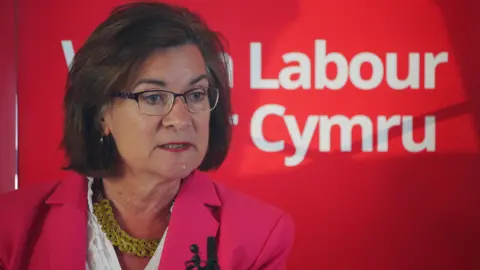People's patience running out on waiting lists - FM
 PA Media
PA Media"There's a new leader in town," says Eluned Morgan.
She's been first minister for less than 11 months and, in another 11 months' time, political opponents hope to remove her from the job.
Morgan leads a party that has had a firm grip on power in Cardiff Bay.
But the opinion polls make dire reading for Welsh Labour. Some suggest its current level of support is behind Plaid Cymru and Reform UK.
That is way below the share of the vote Labour has enjoyed in previous elections to Wales' devolved parliament and it falls to Morgan to do something about it.
"I've been listening to people across Wales and what I'm doing is responding to them by making sure that I'm listening and delivering on their priorities," she said.
"Making sure that we are bringing waiting lists down."
She cites an injection of cash from Westminster when she says they are "pouring money in" to reduce the longest waits for NHS treatment.
"So we are staring to deliver, because we've had that extra money," she says.
"And we know people's patience is running out, but we are getting there.
"It is something that we need to make sure people have heard and they need to understand the threat that happens if we are not in power."
BBC Wales went to St Davids, Pembrokeshire, to check the lay of the land.
It's the first minister's home patch. She hopes to return as one of the Senedd members for the new seat of Ceredigion Penfro in next year's elections.
Window cleaner Pete Baird, a supporter of Reform UK, isn't impressed.
"They've been in power for 26 years and they've done nothing," he said.
"The national health service is worse here than what it is in England."
I bump into former Labour councillor Vic Dennis who said Morgan was a "tremendous asset" and a politician who understands the county's rural economy.
This is a part of the world that pushed out the Conservatives and elected a Labour MP last summer.
So why is it that so soon after that landslide in the general election, Labour is now contemplating such a difficult election to the Senedd?
Part of the reason is the way Nigel Farage's Reform has won support in some traditional Labour heartlands.
But delve into the data and you find an awful lot of Labour voters threatening to go to other parties on the left, especially Plaid Cymru.
Polling expert Jac Larner, from Cardiff University's Wales Governance Centre, said there has always been a tendency for some voters to switch support back and fore between Labour and Plaid Cymru.
"What has changed is the size of that group now - it's bigger than ever," he said.
Another big change is linked to the increase in the number of Members of the Senedd from 60 to 96 at next May's election.
Those members will be elected under a partly-proportional system which is "likely to hurt the Labour Party," said Larner.
 Reuters
ReutersPredicting the number of seats that parties could win is "very, very difficult, especially under this new system", he added, but it is "very within the realms of possibility that Eluned Morgan would lose her seat and would not get elected".
I ask Morgan whether she takes that seriously.
"I'm taking everything seriously. We are going to throw our heart and souls into the campaign over the next year.
"We are in government. We are the only ones who can have serious conversations with the UK government and influence them - and we are influencing them."
Under her "red Welsh way" slogan, Morgan has risked upsetting some in her party by criticising UK government policies, including on welfare cuts.
But opposition parties would dispute that she has influence. Announcements of money for Wales' railways by the Chancellor do not go far enough, they say.
Morgan ran for the Welsh Labour leadership in 2018, coming third to Mark Drakeford and Vaughan Gething.
She stayed out of the contest to succeed Drakeford, but when Gething's leadership collapsed she emerged as the only potential successor.
Bruised by infighting over the controversial donations to Gething's campaign, Labour politicians had no appetite for another leadership contest and anointed Morgan.
In the process, she became Wales' first female first minister.
As things stand, retaining that title could be the toughest electoral test Welsh Labour has faced since devolution started in 1999.
